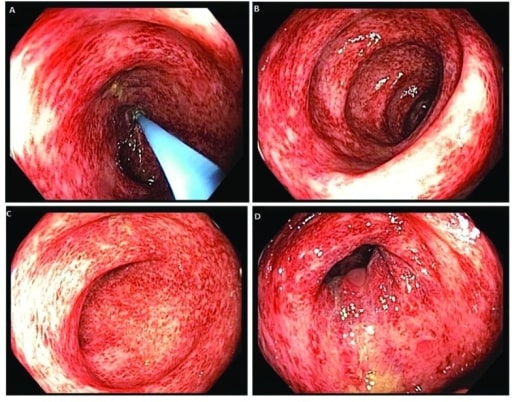Playlist
Show Playlist
Hide Playlist
Lower Gastrointestinal Bleeding
-
Slides Small and large bowel.pdf
-
Download Lecture Overview
00:01 Lower GI bleeding account for 20% of all acute GI bleeding. 00:06 That's a large percentage. The initial evaluation includes DRE, stands for digital rectal examination, and with this bleeding taking place, you need to make sure that the blood pressure is properly stabilized. 00:20 The nuclear scan may be useful for persistent bleeding of unclear source. 00:26 Nuclear scan. Colonoscopy may be used in active bleeding. 00:31 We'll talk about colonoscopy in the, when you would use it and when you would not, but for the most part, you wanna make sure that you will be able to find the source of this lower GI bleeding. 00:41 Angiographic embolization of the bleeding source, most effective therapy in setting up an active bleed. 00:49 But literally, by blocking the bleeding, most effective in terms of halting the actual loss. 00:57 The causes and differentials that you wanna keep in mind: Diverticular disease; painless rectal bleeding; diverticulosis, you have heard of. 01:07 We will talk about this in great detail. Angiodysplasia is right up there. 01:10 Do not forget about what made that, then happened with in blood vessels in which there might be dysplasia. Inflammatory bowel disease especially ulcerative colitis. 01:20 More bleeding but remember, Crohn´s could also result in lower GI bleeding. 01:25 Ischemia is a big time important and an emergent matter that we'll talk about, and known as your ischemic bowel disease. 01:34 Cancers, Meckel´s diverticulum, and hemorrhoids may all be important differentials for lower GI bleeding.
About the Lecture
The lecture Lower Gastrointestinal Bleeding by Carlo Raj, MD is from the course Small and Large Intestine Diseases: Basic Principles with Carlo Raj.
Included Quiz Questions
What is the investigation and treatment of choice for active bleeding from the lower gastrointestinal tract?
- Angiographic embolization
- Ultrasound
- CT scan
- Magnetic resonance imaging
Which of the following is the MOST effective therapy for an active bleed?
- Angiographic embolization
- Colectomy
- Hemicolectomy
- Cauterization
- Clipping the bleeder
Customer reviews
1,0 of 5 stars
| 5 Stars |
|
0 |
| 4 Stars |
|
0 |
| 3 Stars |
|
0 |
| 2 Stars |
|
0 |
| 1 Star |
|
1 |
1 customer review without text
1 user review without text




